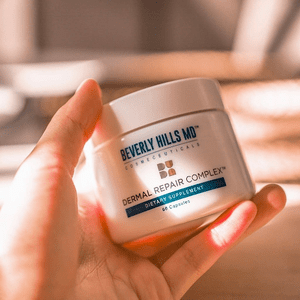How To Fix Aging Skin?
The Look Younger Shortcut You Can Do At The House
Does Botox Get Rid of Wrinkles?

Last Updated on,
May 22nd, 2025

Your skin can develop wrinkles for several reasons, like genetics, sun exposure, and air pollution, but aging is the most common cause. While wrinkles are a normal part of aging and generally cause no harm, you can prevent them if they make you uncomfortable. Botox is one treatment many use to get rid of wrinkles. Before trying it, we recommend you understand how it works and learn about the alternative ways to deal with wrinkles.
Does Botox Work if You Already Have Wrinkles?
The treatment will work regardless of whether you already have wrinkles or want to use it to prevent them before they occur. The effects of Botox will vary depending on the type of wrinkles you have. Dynamic wrinkles appear over time around your eyes and eyebrows due to repeated facial muscle movement when you laugh, smile, and squint. These are often mild and can be easily treated using Botox. Static wrinkles are deeper and occur as your body loses collagen and elastin with age. While Botox will work on these deep wrinkles, the benefits are limited.
How Does Botox Work to Minimize Wrinkles?
Botox is an injection that has an ingredient called botulinum toxin. It is a prescription medicine that must be injected into the muscles of your face and neck. Once a doctor administers Botox, botulinum toxin diffuses to the tissues and temporarily blocks the signals between your muscles and nerves. Because of this, the muscles no longer contract, reducing the appearance of wrinkles and fine lines on your face.
Read more: How to prevent wrinkles
How Long Does it Take for Wrinkles to Go Away After Botox?
After Botox is injected, it can take a few days before you begin to notice the effects. You should see the fine lines disappearing within a week or two. The time it takes for the treatment to start working can vary from person to person, depending on things like muscle strength and metabolism.
Remember that though Botox can reverse wrinkles, the results are temporary. That means the wrinkles will reappear on your skin once the effects of the treatment wear off. This happens because your body rejuvenates and reestablishes the link between your muscles and nerves. It should take about 10 to 12 weeks for the fine lines to return, depending on the concentration of the Botox injection. Once the effects wear out, you can consult a doctor and get another dose.
Read more: How to slow aging
Botox Alternatives for Reducing Wrinkles
A Botox injection may help you get rid of fine lines, but you will need to consult with a doctor and take additional measures to tackle static or deeper wrinkles.
Dietary Supplements
Research shows that collagen supplements reduce wrinkles. In one study, participants who used a specific bioactive collagen peptide (BCP) supplement developed more collagen and elastin in their skin after eight weeks, which helped reduce wrinkles. Besides collagen, some supplements have other nutrients to promote smooth, plump skin. For instance, the Beverly Hills MD Dermal Repair Complex has hyaluronic acid, saw palmetto, and vitamins A and B in addition to collagen.
Topical Serum
You can use facial serums like the Beverly Hills MD Rapid Lift Advanced Neck Serum along with Botox to remove deep wrinkles more effectively. This serum contains Vin-uplift, a cosmetic ingredient derived from Swiss Ice Wine. It offers two important benefits: it creates a smooth, flexible film on your skin’s surface to reduce the appearance of fine lines and nourishes and protects your skin.
Sunscreen
Ultraviolet (UV) rays from the sun can cause visible signs of aging, including wrinkles. So it’s best to take precautions before stepping out on sunny days. A sunscreen with an SPF of 30 or higher can reflect harsh UV rays and reduce the negative impact on your skin.
Healthy Lifestyle
A healthy lifestyle can reduce wrinkles naturally. Eating fruits, yellow vegetables, and soy can give you a healthy dose of nutrients that improve skin health. In addition to eating skin-healthy foods, you must get at least eight hours of sleep every night to improve your skin quality. Another tip is to drink enough water (at least eight glasses a day). Water will keep your skin hydrated and make it appear plump and smooth.
Read more: Anti-Aging Skincare Routine
FAQs
All forms of Botox injections approved by the U.S. Food and Drug Administration are safe. Even so, you should receive Botox under the supervision of a licensed healthcare provider.
A Botox injection does help get rid of existing wrinkles, but the effects can vary depending on the type of wrinkles you have and their severity.
The treatment will reduce most wrinkles, including forehead creases, but the results are not permanent. The effects start to wear off in about 12 weeks, after which you may require another dose.
While Botox can be used for deep (static) wrinkles, they may not disappear completely. To reduce their appearance further, you may have to consider additional remedies, like supplements and topical serums.
You can use the treatment to minimize fine lines and wrinkles on any part of your face, including your forehead.

- Zuri Hawkins-Jarrett graduated with her doctorate in pharmacy from The University of Georgia College of Pharmacy. She completed her residency training with Piedmont Columbus Regional in ambulatory care.
- Zuri also has a Master of Public Health degree from Emory University with a focus on Prevention Science. She has a passion for pharmacy and public health to help those in her community diagnosed with chronic conditions.




There are no comments yet